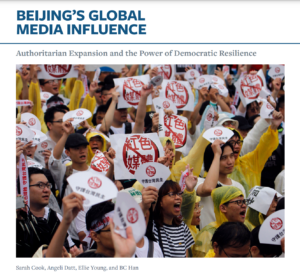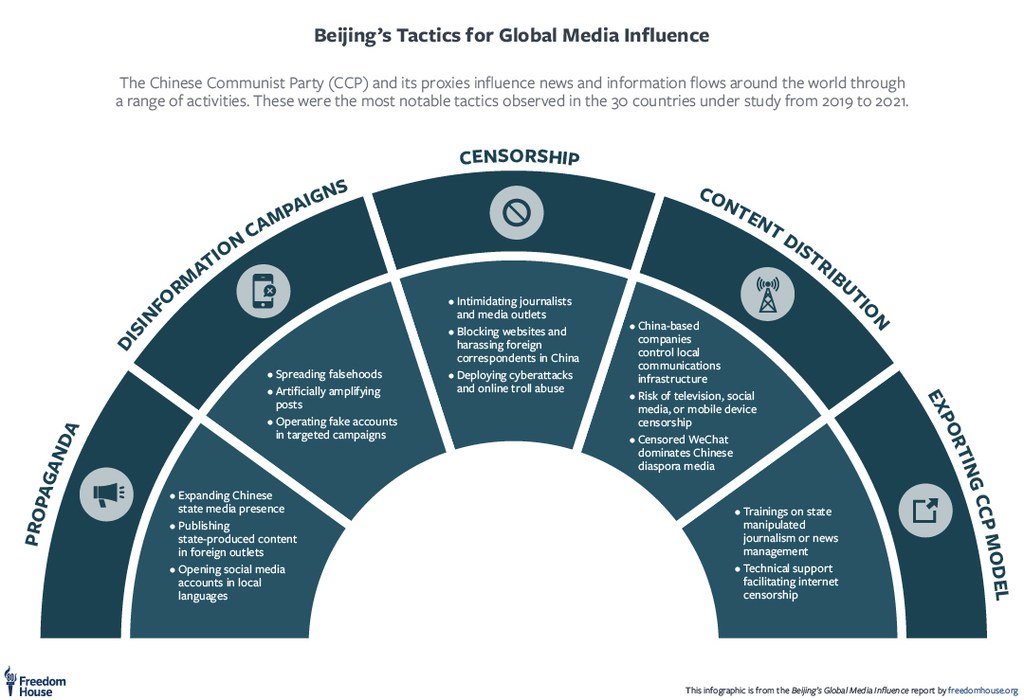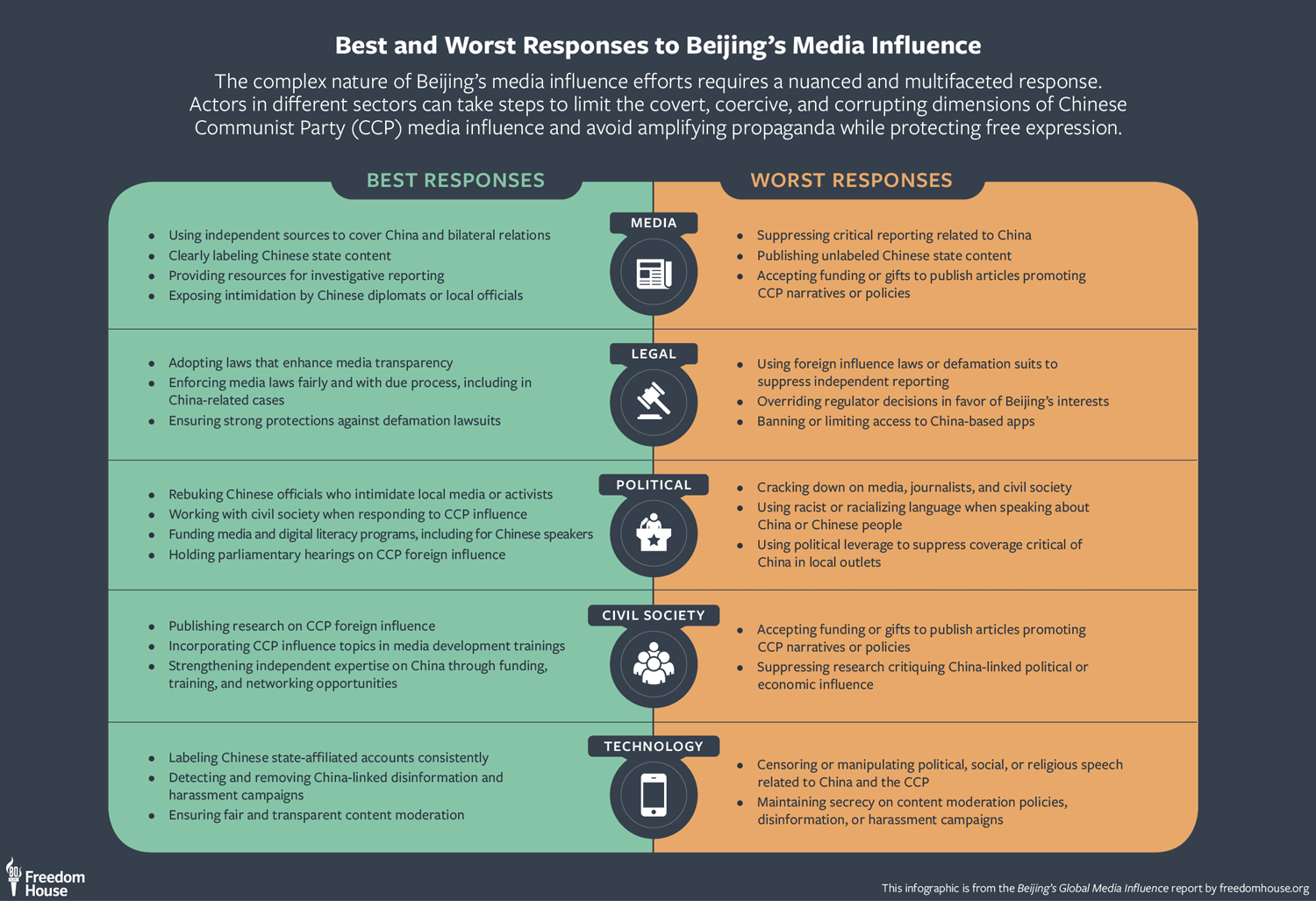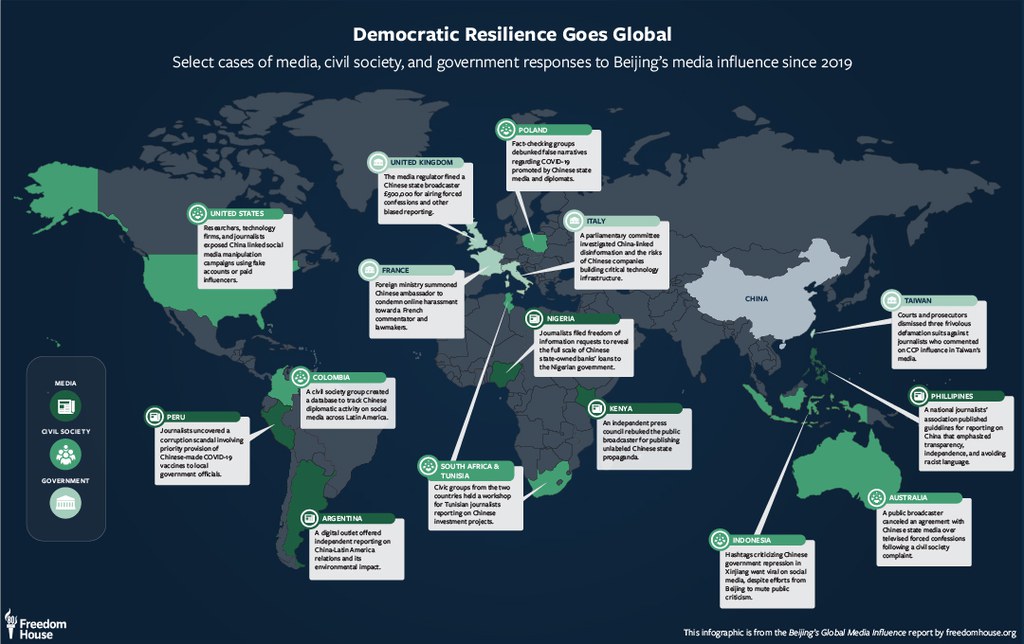
The Chinese Communist Party (CCP) is adopting more covert and aggressive tactics in a multibillion-dollar drive to shape global opinion and consolidate its domestic power in China and its priority interests abroad, according to a new report from Freedom House. But their efforts are meeting pushback from journalists, civil society groups, governments, and media consumers, analysts Sarah Cook, Angeli Datt, and Ellie Young write in Beijing’s Global Media Influence: Authoritarian Expansion and the Power of Democratic Resilience.
The Chinese government and its proxies are using more sophisticated, covert, and coercive tactics—including intensified censorship and intimidation, deployment of fake social media accounts, and increased mass distribution of Beijing-backed content via mainstream media—to spread pro-CCP narratives, promote falsehoods, and suppress unfavorable news coverage, the report states.
“Beijing is doubling down on its campaign to control how it is portrayed in the world and to bend foreign media to its will,” said Michael J. Abramowitz, president of Freedom House. “These efforts seek to silence criticism of the regime and convert independent media into shills for the Chinese Communist Party. Journalists and some governments are pushing back, but more should be done to prevent Beijing’s influence from undermining fact-based reporting about the world’s most powerful authoritarian state and its activities abroad.”

The intensity of CCP media influence efforts was found to be High or Very High in 16 of the 30 countries analyzed, with 18 facing increased influence efforts over the 2019–21 period. Taiwan, the United States, and the United Kingdom experienced the most intense influence efforts, the report notes, but strong campaigns were also documented in Nigeria, Spain, Italy, Kenya, the Philippines, and Argentina, highlighting the global scope of Beijing’s ambitions.
“In every country,” the researchers add, “Chinese diplomats or state media outlets openly promoted falsehoods or misleading content to news consumers — on topics including the origins of Covid-19, the efficacy of certain vaccines, and pro democracy protests in Hong Kong — in an apparent attempt to confuse foreign audiences and deflect criticism.”
 Journalists, commentators, civil society groups, regulators, technology firms—and to a lesser extent, policymakers—are contributing to the pushback through actions including investigations into opaque payments from China-linked entities to local elites, cancellations of content-sharing agreements with Chinese state news agencies, regulatory enforcement of broadcasting rules, and public condemnation of attempts by Chinese diplomats to intimidate journalists, adds the report, funded by the National Endowment for Democracy (NED), amongst other donors.
Journalists, commentators, civil society groups, regulators, technology firms—and to a lesser extent, policymakers—are contributing to the pushback through actions including investigations into opaque payments from China-linked entities to local elites, cancellations of content-sharing agreements with Chinese state news agencies, regulatory enforcement of broadcasting rules, and public condemnation of attempts by Chinese diplomats to intimidate journalists, adds the report, funded by the National Endowment for Democracy (NED), amongst other donors.
“Many democracies are proving far from helpless in the face of Beijing’s media influence efforts,” said Sarah Cook, Freedom House’s research director for China, Hong Kong, and Taiwan. “This is a critical moment. Governments and societies worldwide should increase transparency and protections for press freedom and free expression. More democracy, not less, is the answer to Beijing’s campaign to control news and information around the world.”
It is all a large-scale effort to control China’s image abroad, said Freedom House’s Angeli Datt, co-author of the report. “Beijing’s goal in undertaking this aggressive and expensive global campaign is to shape public opinion and distort how people view the party and its actions,” she told DW.

Additional report findings:
- The list of those contributing to Beijing’s influence efforts is expanding. The Hong Kong authorities, companies with close CCP ties like Huawei, local officials, and media executives outside China have joined Chinese diplomats and government representatives in attempting to suppress critical reporting or shape media narratives in Beijing’s favor….. Beijing’s efforts have come up short in influencing public opinion, but present other threats to free expression. In 23 out of 30 countries, public opinion toward China or the Chinese government has declined since 2018, indicating comparatively modest returns on the CCP’s considerable investment in shaping foreign views…..
-

National Endowment for Democracy (NED)
Democracies’ ability to counter CCP media influence is alarmingly uneven. Only half of the countries examined in this study achieved a rating of Resilient, while the remaining half were designated as Vulnerable. Taiwan faced the most intense CCP influence efforts, but it also mounted the strongest response, followed in both respects by the United States. Nigeria was deemed the most vulnerable to Beijing’s existing media influence campaigns, while Senegal had the weakest underlying capacity for resilience.
- Inadequate government responses leave countries vulnerable or exacerbate the problem. Local laws that protect free expression help curtail Beijing’s efforts, but declines in press freedom and gaps in media regulations have undercut democratic resilience and created greater opportunities for future CCP media influence. In 23 countries, political leaders launched attacks on domestic media or exploited legitimate concerns about the Chinese government to impose arbitrary restrictions, target critical outlets, or fuel xenophobic sentiment.
View the full report findings here.
The project was supported by the U.S. Department of State, the National Endowment for Democracy (NED) and the Hurford Foundation. Additional support was provided by the Arch Puddington Fund for Combatting Authoritarianism, which was established by generous donors in honor of Senior Emeritus Scholar Arch Puddington to help carry forward his decades-long commitment to the cause of freedom and democracy.







